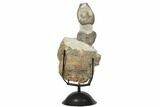12.8" Two Hadrosaur (Hypacrosaur) Vertebrae In Sandstone Base
This is a unique, 12.8" tall, natural association of two vertebrae that are still within the rock they were found in, collected from the Two Medicine Formation of Montana. The vertebrae were collected this last summer and have been meticulously prepped and sculpted into this fascinating specimen.
Both vertebrae are natural and required very little repair. The "top" vertebra required some crack repair and gap fill restoration through the superior half of the neural canal. There is some glue stabilization along the point of contact between the lower vertebra and rock.
These vertebrae come from a site that produces a significant amount of hadrosaur (Hypacrosaurus) material. Because of this, it's extremely likely that both of these are caudal vertebrae of Hypacrosaurus.
The entire specimen measures 12.8" tall by 6.6" wide, and when placed on the accompanied custom metal display stand, it measures 15.1" tall. The upper vertebra is 3.4 x 2.4" and the lower vertebra is 2.7" wide.
Both vertebrae are natural and required very little repair. The "top" vertebra required some crack repair and gap fill restoration through the superior half of the neural canal. There is some glue stabilization along the point of contact between the lower vertebra and rock.
These vertebrae come from a site that produces a significant amount of hadrosaur (Hypacrosaurus) material. Because of this, it's extremely likely that both of these are caudal vertebrae of Hypacrosaurus.
The entire specimen measures 12.8" tall by 6.6" wide, and when placed on the accompanied custom metal display stand, it measures 15.1" tall. The upper vertebra is 3.4 x 2.4" and the lower vertebra is 2.7" wide.
About Hypacrosaurus
Hypacrosaurus is a very large, Lambeosaurini Hadrsosaur that would have been almost as large as the Tyrannosaurs that it lived alongside. Like Corythosaurus, it had a tall, hollow, rounded crest, although not as large and straight. It is known from the remains of two species that spanned 75 to 67 million years ago in the Late Cretaceous of Alberta, Canada, and Montana, United States, and is the latest hollow-crested duckbill known from good remains in North America. It is estimated to have been around 9.1 meters (30 feet) long and to have weighed up to 4-5 tons.
Hypacrosaurus is a very large, Lambeosaurini Hadrsosaur that would have been almost as large as the Tyrannosaurs that it lived alongside. Like Corythosaurus, it had a tall, hollow, rounded crest, although not as large and straight. It is known from the remains of two species that spanned 75 to 67 million years ago in the Late Cretaceous of Alberta, Canada, and Montana, United States, and is the latest hollow-crested duckbill known from good remains in North America. It is estimated to have been around 9.1 meters (30 feet) long and to have weighed up to 4-5 tons.
About The Two Medicine Formation
The Two Medicine Formation is a geographical formation in Central Montana and Southern Alberta, Canada. The formation is predominantly sandstone laid down by rivers and deltas during the Campanian Age of the Cretaceous, about 80-75 million years ago. Approximately two thousand feet thick on the western edge, it lies on top of the Virgelle Sandstone formation and under the Bearpaw Shale. It is located between the Front Range of the Rocky Mountains and the Sweetgrass Arch, a tectonic fold feature 40-90 miles east of the Front Range.
The Two Medicine is the same age as the Judith River Formation found further east. It was laid down further inland from the Western Interior Seaway, while the Judith River Formation was deposited along the coast. The Two Medicine contains much of the same dinosaur fauna, but fewer reptiles, amphibians, and aquatic fossils.
The Two Medicine Formation is a geographical formation in Central Montana and Southern Alberta, Canada. The formation is predominantly sandstone laid down by rivers and deltas during the Campanian Age of the Cretaceous, about 80-75 million years ago. Approximately two thousand feet thick on the western edge, it lies on top of the Virgelle Sandstone formation and under the Bearpaw Shale. It is located between the Front Range of the Rocky Mountains and the Sweetgrass Arch, a tectonic fold feature 40-90 miles east of the Front Range.
The Two Medicine is the same age as the Judith River Formation found further east. It was laid down further inland from the Western Interior Seaway, while the Judith River Formation was deposited along the coast. The Two Medicine contains much of the same dinosaur fauna, but fewer reptiles, amphibians, and aquatic fossils.
$1,750
SPECIES
Hypacrosaurus sp.
LOCATION
Pondera County, Montana
FORMATION
Two Medicine Formation
SIZE
Sculpture Size: 12.8 x 6.6", Height on Stand: 15.1" tall
CATEGORY
SUB CATEGORY
ITEM
#192744
We guarantee the authenticity of all of our specimens.
 Reviews
Reviews

















